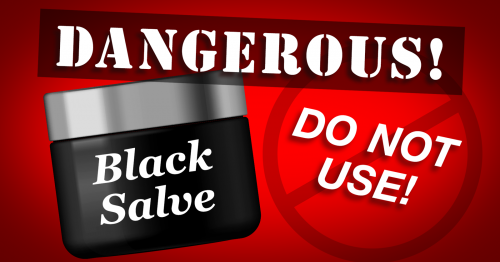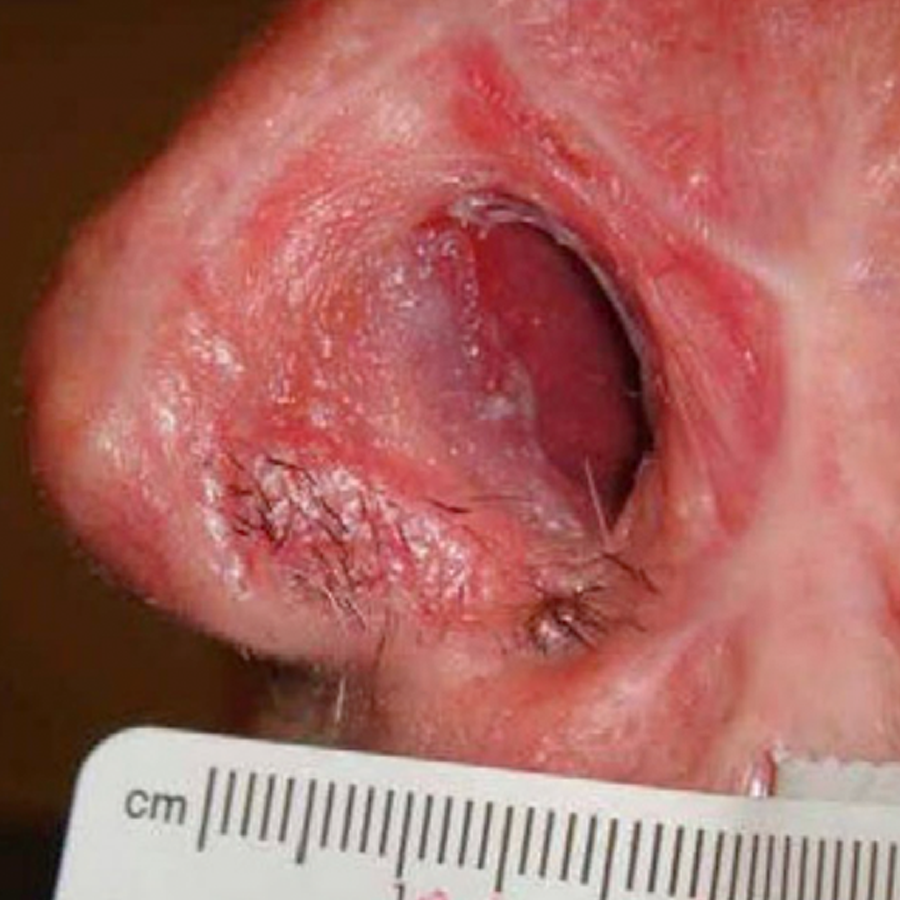Image

You may have seen websites selling certain salves or creams (commonly known as “black salve”) claiming to treat or cure cancer, boils, moles and skin tags (benign, or non-cancerous, growths of the skin).
These claims are false. Salve products containing corrosive ingredients, including black salve, are dangerous and are not approved by the U.S. Food and Drug Administration (FDA) to treat or cure any skin condition, particularly not skin cancer. Specifically, the FDA is warning consumers not to use any salves or other topically applied products that list any of the following potentially dangerous ingredients: sanguinarine, Sanguinaria canadensis, or bloodroot, alone or in combination with zinc chloride.
Although not all salves are dangerous, topically applied products with the above ingredients can destroy the skin and result in permanent disfigurement, tissue necrosis (death of cells in living tissue), and can result in infection. Furthermore, using salve products such as black salve for serious conditions like skin cancer can result in delayed cancer diagnosis and cancer progression.
What Are Salves that Contain Corrosive Ingredients?
Some salve products contain corrosive ingredients, highly reactive substances that injure living tissue. They act either directly, by chemically destroying the tissue (oxidation), or indirectly by causing inflammation. Either way, the result is damaging, painful and can result in permanent disfigurement (scarring).
Many salve products that contain corrosive ingredients claim to draw out only the cancer, leaving healthy skin untouched. This is false. The ingredients in these products destroy cancerous and healthy skin equally. Using these products can result in permanent scarring and may even result in the need for reconstructive (plastic) surgery. In addition, these salves can destroy the top layer of skin while leaving cancer behind in the deeper layers, where the cancer may continue to grow.
How Do You Know If It’s A Corrosive Salve?
Corrosive salve products include products such as black salve. According to Cynthia Ng in the FDA’s Center for Drug Evaluation and Research, “Consumers need to know that ‘black salve’ is an informal term and not the only name used for this product.”
It is also sold under such names as Skinprov, drawing salve, red salve, Cansema, bloodroot, Indian Herb, Hawk Dok Natural Salve, Black Drawing Ointment, and many others. The products come in many forms including salve, paste, cream and poultice (soft, moist material applied to wound). In some cases, corrosive salves may be marketed as natural or homeopathic products. In some instances, the corrosive ingredients are listed as “inactive” ingredients.
Ng adds that if you’re not sure if a product is, in fact, a black dangerous salve product, you can look for these (active and/or inactive) ingredients: sanguinarine, Sanguinaria canadensis, bloodroot, and zinc chloride, any of which signal that it is a harmful product and you should not use it.
Watch out for the following red flags:
- Salve products with the following names: black salve, drawing salve, red salve, Cansema, bloodroot, Indian Herb, Hawk Dok Natural Salve, Black Drawing Ointment, and many others. The products come in many forms including salves, pastes, creams, and poultices.
- Products that contain any of these ingredients: sanguinarine, Sanguinaria canadensis, bloodroot, and zinc chloride.
- Salve products that claim to cure or treat cancer, remove moles or warts, or treat other skin conditions.
- Products with instructions to expect burning, pain, or scar formation at the application site. The sellers often state to expect a thick, dry scab on the skin.
Consumers Have Reported Harmful Side Effects to the FDA
The FDA has identified 24 cases of adverse events (bad side effects) associated with black salve. Fifteen of these cases were reported within the past five years.
These have included instances of permanent disfigurement and cancer progression. The FDA is aware of at least one death that resulted from a person who opted to use a corrosive salve rather than pursue proven cancer therapies.
The agency urges consumers to see a health care professional to obtain an accurate diagnosis and receive appropriate treatments.
The agency also continues to send warning letters and take enforcement action against companies making false claims about these products.
To report adverse events or side effects related to the use of these products, health care professionals and consumers can:
Other Things You Can Do to Stay Safe
- Contact your health care professional or dermatologist if you have any concerns about skin cancer or other skin-related issues. Be sure to tell them about any products, including herbal or other “natural” products, that you may be using for any skin-related issues.
- Do not use black salve or salve products that contain sanguinarine, Sanguinaria canadensis, or bloodroot, alone or in combination with zinc chloride, as an alternative to proven medical therapies. This can result in permanent disfigurement and in the worst case, death.
- Learn how to recognize health fraud scams.

